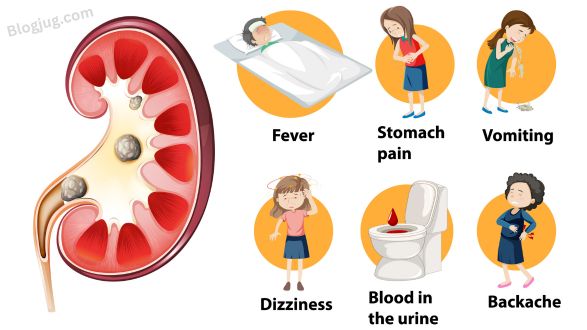The back, abdomen, groin, or sides can all hurt from kidney disease. It’s frequently misdiagnosed as back pain. Kidney cancer, kidney stones, infections, and injuries can all result in kidney pain. Treatment for kidney discomfort is based on the underlying reason.

Overview
What is kidney pain?
Anguish close to your kidneys is known as kidney pain. On either side of your spine, immediately below your ribcage, are the two bean-shaped organs that make up your kidneys. Though it typically points to a problem elsewhere in your urinary system, kidney pain does not necessarily suggest a problem with your kidneys specifically.
How do your kidneys feel when they hurt?
Kidney pain is frequently misdiagnosed as back pain. However, there are a few significant distinctions between the sensations of kidney and back pain.
Kidney pain vs back pain
Back discomfort typically affects the middle back, the area over the spine, and the lower back most of the time. Back discomfort can also occasionally travel down your legs due to problems with your spine.
In comparison, kidney pain hand usually occurs deeper and higher on your back. Kidney pain typically manifests as pain under your ribs, to the left or right of your spine. Your groin or abdomen may also experience radiating kidney pain. Although hip pain is located lower in the back than kidney pain, the two can occasionally be mistaken for one another.
Possible Causes
What are the most typical reasons why kidney pain?
The tubes that convey urine from your kidneys to your bladder, known as ureters, are related to both your bladder and kidneys. Pain and discomfort may arise from issues in any of these areas. Among the potential reasons for kidney pain are:
1. Kidney stones: The accumulation of minerals or other chemicals inside your body might lead to kidney stones. Stones come in a variety of sizes, from tiny sand grains to larger than pearls. You might naturally expel little stones from your body. Larger stones, however, have the potential to lodge in your urinary tract and obstruct the flow of urine. Severe renal pain may occur in any scenario.
2. Urinary retention: You can’t fully empty your bladder when you have this illness. This could occur all at once or gradually over time.
3. Vesicoureteral reflux: Urine flows backward from your bladder to your ureters or kidneys as a result of this reflux. Although VUR can affect anyone, infants and small children are the most commonly affected.
4. Ureteropelvic junction obstruction: This illness is characterized by an obstruction where the ureter joins the kidney. This may result in groin or belly pain that radiates radiate to your belly or groin.
5. Ureteral stricture: This is a reference to your ureter narrowing. The tubes that transfer urine from your kidneys to your bladder are called ureters. Either one or both sides may have a ureteric stricture.
6. Kidney infection: Your kidneys become infected with germs, which causes this disorder. Fever, chills, side or back pain, nausea, and vomiting are some of the symptoms.
7. Polycystic kidney disease: Individuals with this hereditary disorder have kidney cysts, which are sacs filled with fluid. The kidneys swell and may become painful as the cysts grow. They might therefore not operate as intended.
8. Injury or trauma: The kidneys can sustain physical harm from contact sports, accidents, or other blunt force trauma. Urine leaks from the kidneys as well as blood in the urine or surrounding the kidneys could arise from this.
9. Kidney (renal) cancer: Renal cell carcinoma, the most prevalent kind of kidney cancer, typically strikes adults in their 60s or 70s. Blood in your urine, flank pain, or the appearance of a lump on your side. are possible symptoms.
What are common kidney pain symptoms?
Different symptoms might be experienced by those with kidney pain. Symptoms of kidney pain that are frequently experienced include:
1. A dull, persistent pain in your back.
2. Pain in your abdomen, beneath your ribs, or on your sides.
3. Severe or severe pain that waves in.
4. Pain that travels to your lower abdomen.
5. Vomiting or nausea are frequently experienced together with kidney pain, particularly when kidney stones are the cause of the pain.
Care and Treatment
How is kidney pain treated?
Treatment for kidney pain is based on the underlying cause of the discomfort. For instance, your doctor may recommend antibiotics if you have kidney pain brought on by an infection. You could require treatment to get rid of the stones if they are the cause of your kidney pain.
Which tests can identify the kidney pain’s underlying cause?
Several diagnostic tools are available to assist your healthcare professional in determining the cause:
1. Urinalysis: This test looks for blood, proteins, white blood cells (which could indicate an infection), and specific chemicals that are connected to several kidney illnesses.
2. Imaging tests: A CT (computed tomography) scan or an ultrasound can produce images that show the kidneys’ and urinary tract’s physical structure. It can also detect the presence of stones and assess the appropriateness of urine flow.
What should I do if my kidneys hurt?
The first thing you should do if you have persistent kidney pain is to make an appointment with your doctor. You should also visit the emergency room if you experience any other symptoms, such as uncontrollable high temperature, chills, or nausea, or if you are unable to urinate. Here are some actions you can take to reduce discomfort in the interim:
1. Stay hydrated: Getting plenty of water will aid in clearing your urinary tract of bacteria. Avert alcohol and beverages with caffeine.
2. Use heat: To ease renal pain, place a heating pad on your side, back, or belly.
3. Take pain relievers: Use over-the-counter pain treatments such as acetaminophen or ibuprofen to reduce fever or discomfort (unless you have known liver or kidney problems, in which case you should not use these medications).
Which beverages are harmful to the kidneys?
Water is generally the best. Drinks with high sugar content can induce diabetes, while those with high salt or caffeine content can dehydrate you and harm your kidneys over time.
When to Call the Doctor
When should I call my healthcare provider?
Consult your physician if you experience ongoing pain in the kidney region or if any of the following symptoms are present along with your back pain:
1. Fever or chills.
2. Vomiting or nausea that prevents you from eating or drinking.
3. Oddly colored pee.
4. Pain when you pee.
5. Blood in your pee.
6. An unexpected, persistent, and strong urge to urinate.
7. The presence of kidney stones or other solid substances in your urine.
8. A persistent generalized sense of sickness or lethargicness.
A note from Blogjug
Mild or severe kidney pain is possible. Although it can occasionally be harmless, it usually indicates that there is an issue with your urinary system. See a doctor straight immediately if you experience back pain coupled with a fever, vomiting, pain while urination, or other concerning symptoms. They can identify the cause of your kidney pain and determine the best course of action.









1 thought on “Kidney Pain: Causes, Syptoms and Treatment”